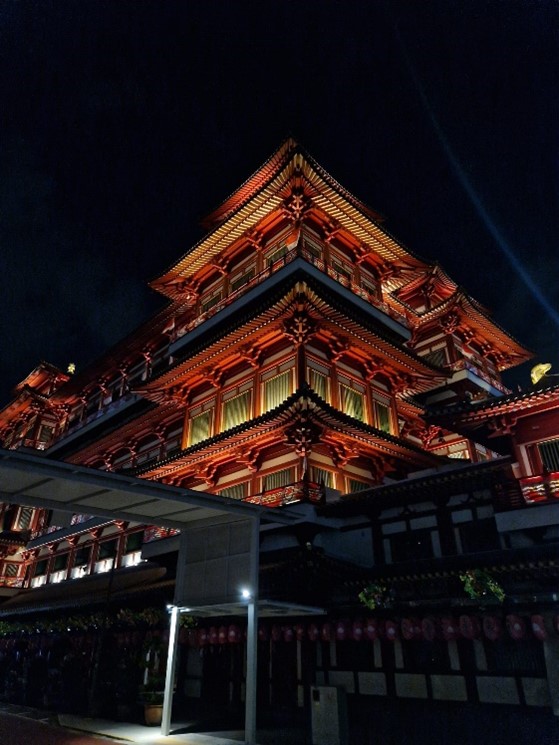By Daria Slaby
With the study abroad application period being in full swing, many students are weighing up their options. Just last year I was in the same position, as a student of BA East Asian Studies I had many countries and universities to consider before making my final choice. Initially I was looking into New Zealand, Canada and South Korea, immediately overlooking the option for Singapore. Perhaps this came from unfamiliarity with the country or maybe it didn’t seem appealing enough at first thought. As the application period closing time began approaching, I decided to investigate the ‘less popular’ options too, I immediately fell in love with what Singapore has to offer and I confidently assigned NUS (National University of Singapore) as the first choice of my application. I am now nearing the end of my first semester at NUS and I haven’t once regretted my decision. I hope that my (hopefully as objective as possible) list of pros and cons will encourage you to consider, is studying abroad in Singapore right for you?


(Buddha Tooth Relic Temple: Changi Airport Jewel)
Pros:
Exciting activities, all close by
Whilst Singapore is a small city state, there are many activities available to keep busy with. Soon I will be dedicating a post to the fun districts, neighbourhoods and activities I recommend checking out in Singapore so I will only briefly list a few examples here. During my 3 months here so far, I have enjoyed the jewel at Changi Airport, visited China Town, Little India, The Arab Quarter. I have been to the bay area many times where I saw the Merlion fountain statue, the helix bridge, beautiful night-time view of the MBS hotel as well as the spectacular light and water show at the boardwalk. Through meeting other exchangers, I got to go to museums, art exhibits, fashion shows, the aquarium, many parks and in particular the beautiful national botanical park, and the list continues. I truly believe Singapore has so much to offer and I’m not sure I will get the chance to see and experience everything else before I leave.

(Merlion)
Proximity to other countries and travel opportunities
Singapore’s advantageous location within Southeast Asia provides a wonderful opportunity to travel for any budget. So far, I have been incredibly lucky to get to visit Taiwan during my first reading week and just last week I came back from the capital city of Malaysia, Kuala Lumpur. There are many more countries I intend to visit during my stay here and the opportunity to do so at a much cheaper price than if I was travelling from the UK is amazing. My friends have travelled to so many wonderful places including Vietnam, Thailand, Indonesia, Japan, The Philippines, Hong Kong and more. Anyone wishing to come to Singapore will be spoilt for choice for travel.


(Batu Caves- Kuala Lumpur, Malaysia: Taipei 101- Taipei, Taiwan)
Greenery and beautiful environment
One of my favourite things about Singapore is the beautiful greenery. Nature here is truly unmatched and the joy of seeing wild palm trees across the city warms my little English-midlands heart. After getting in my taxi from the airport when I first landed, I was so excited by the view from the window. I wonder what the driver was thinking when he saw me filming ordinary trees (maybe he thought I had escaped some barren land or desert). The Botanical Garden is a very beautiful showcase of the Singaporean habitat and I truly believe that living in such proximity with nature is healing to the soul.

(Shaw Amphitheatre Botanic Gardens)
Safety
As a female travelling so far from home all by myself, my family worried for my safety. Singapore has truly blessed me with the freedom to explore by myself, also at night, with no concerns. People generally keep to themselves, and it is normal to leave personal belongings such as laptops or phones on tables in public unattended. Whilst I must stress that everyone should practice common sense and still pay attention to their surroundings, the general atmosphere in Singapore is very different. One culture shock I experienced was the shock of my Singaporean friends when I would say “get home safe”. One exchange friend asked me what I meant and looked visibly concerned as if I had threatened her. I quickly learned that in situations where ordinarily my guy friends would walk me home, here I have the freedom to walk myself.

(Super Tree Grove)
Cons:
Climate
Singapore lies very closely to the equator which means temperatures throughout the year are high and consistent. I have been here since August and have never seen temperatures drop below 27® including at nighttime. Having lived in the UK for most of my life, this climate has and continues to be an adjustment. Most buildings, modes of public transport and MRT (subway) stations are air conditioned, however, the difference in temperature between a chilly air-conditioned lecture theatre and the hot outdoors can be harsh and difficult to get used to. I moved into campus accommodation that does not include an AC unit which made living in the room almost unbearable for me (given the temperatures I am accustomed to). I resolved this by buying a portable AC unit and attending lectures or other areas where I know air conditioning will be aggressively cold with a jacket. These have made a huge difference to my standard of living, and I am now entirely comfortable and love staying at my accommodation. The climate is not something to be put off by but certainly something that must be taken note of prior to arriving.

(Arab Quarter)
Price
I have received some questions about price of living in Singapore via the TAP (The Ambassador Platform) app. I invite anyone who would like to get to know more to reach out to us through this app, we would love to answer your questions 😊. Regarding price, prior to coming to Singapore I was incredibly concerned. I heard many mixed signals and was unsure of how to prepare for the cost of living here.
Firstly accommodation, this is possibly the most expensive aspect of living in Singapore. Surprisingly, NUS campus accommodation is significantly cheaper than that in the UK. However, if a student is unsuccessful in being assigned campus accommodation, they must seek private options which are significantly more expensive. Prices on campus range depending on whether there is AC, a meal plan, where the room is, whether there is another person living in the same room and so on. In my case, I was extremely lucky to secure a room at the PGPR student village where I enjoy a room to myself with no built in AC and no meal plan. Rates for this sort of room can range between £3,000- £3,800 per year (not including the charge for holiday stay during winter break). However, if staying in a private apartment, £3,000 could be the charge per month. This is a huge difference and so prospective students must understand the realities of living off campus and the existing risk of not being assigned student housing. Most of the people I know were successful in securing campus housing, however, I have also met a few people who were not so lucky.
Secondly, price of transport. Singapore has a very efficient and effective public transportation system which comprises of buses and the MRT system (subway train). In my opinion, both options are very reasonably priced and most single fares fall between S$1-2 (60p-£1.20). It is very easy to get around Singapore and the entire island can be seen for cheap. I consider the public transport to be cheaper than in the UK. Additionally, taxis are not too expensive. For example, after landing I took the taxi from the airport on the east side to my accommodation on the Southwestern side of the island and I paid around £18-20 for this.
Finally, food. Eating at campus canteens (there are MANY) is cheap. I generally pay between S$4-7 (£2.40- £4.20) for a filling hot meal. Many Singaporeans also dine in hawker centres or food courts where food is of a similar price. A dinner at a lower standard restaurant generally starts at S$20+ (£12+) and eating out at nicer places can get pricier. Over the last three months I have mainly dined at food courts and university canteens, and I am relatively happy with both the quality and price of food. However, buying groceries is extremely expensive. Food in stores is far more expensive compared to the UK and choosing to only cook at home would be a very pricey ordeal. For example, 3 carrots recently cost me around £4.50. Vegetables are expensive and so are meat, sweets and other staples. I once saw a frozen cheese pizza for around £15. It is possible to live entirely from the canteens, however, it is a little unrealistic to avoid grocery stores altogether. So, anyone interested in coming to Singapore should be prepared to overspend for necessities like bread and cheese (also very expensive).
Overall, I would say that since the campus accommodation is so much cheaper than what I would be paying in the UK, expenses such as food shopping are less impactful. A student successful in securing on campus accommodation should be prepared to spend a little more than what they would otherwise spend in the UK, but I wouldn’t say that cost should be a deterrent to anyone considering studying abroad in Singapore.
I hope that this brief overview will spark interest in studying abroad in Singapore and I encourage anyone interested to look into it. Should you have any questions, I would love to hear from you on the TAP app.
Good luck everyone!

